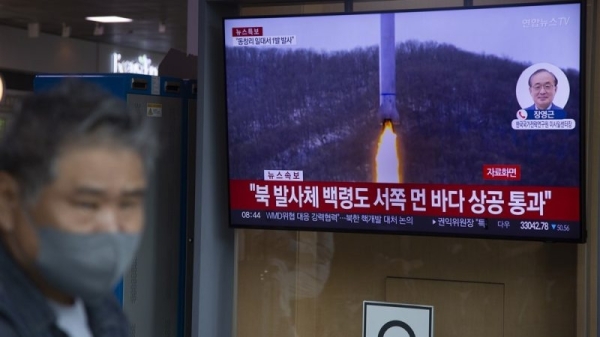EU strongly condemns North Korean attempted spy satellite launch

The EU joined the US and other allies in strongly condemning a North Korean spy satellite launch using ballistic military technology that ended in failure earlier on Wednesday (31 May).
The launch ended in failure, sending the booster and payload plunging into the sea, North Korean state media said, and the South’s military said it had recovered parts of the launch vehicle.
The new “Chollima-1” satellite launch rocket failed because of instability in the engine and fuel system, state news agency KCNA reported.
The flight was the nuclear-armed state’s sixth satellite launch attempt, and the first since 2016. It was supposed to put North Korea’s first spy satellite in orbit.
It prompted emergency alerts and brief evacuation warnings in parts of South Korea and Japan. The notices were withdrawn with no danger or damage reported.
South Korea’s Joint Chiefs of Staff said the military was conducting a salvage operation to recover what is believed to be parts of the space launch vehicle.
The military shared pictures of a large cylindrical object floating in the sea about 200 km (124.27 miles) off the west coast island of Eocheongdo.
George William Herbert, adjunct professor at the Center for Nonproliferation Studies and a missile consultant, said the images showed at least part of a rocket, including an “interstage” section designed to connect to another stage.
It is most likely a liquid-fuel rocket, and a round, brown object inside is likely a propellant tank for either fuel or oxidizer, Herbert added.
Officials from the United States, Japan, South Korea held a phone call, where they “strongly condemned” the launch, Japan’s foreign ministry said.
“The three countries will stay vigilant with high sense of urgency”, the statement said.
The White House condemned a launch using ballistic missile technology and said it was assessing the situation in coordination with allies.
The EU also strongly condemned the North Korean launch, which it said was in “complete disregard for its obligations under UN Security Council resolutions” and threatened international and regional peace and security.
The EU called on all members of the United Nations, especially the UN Security Council where China and Russia sit, to “speak out and demonstrate that such actions will never be accepted”.
North Korea had said it would launch its first military reconnaissance satellite between 31 May and 11 June to boost monitoring of US military activities.
South Korea last week placed satellites in orbit with a domestically designed and produced rocket for the first time, and China sent three astronauts to its space station as part of crew rotation on Tuesday.
The North Korean rocket plunged into the sea “after losing thrust due to the abnormal starting of the second-stage engine,” KCNA reported, in an unusually candid admission of a technical failure by the North.
Pyongyang’s National Aerospace Development Administration (NADA) will investigate the “serious defects” and take action to overcome them before conducting a second launch as soon as possible, KCNA said.
Warnings issued
North Korea appeared to have rushed its satellite launch after Seoul’s recent space rocket launch, a South Korean lawmaker said citing his country’s intelligence agency.
Lawmaker Yoo Sang-beom told journalists that North Korea’s leader was believed to have observed the launch.
“Even if this satellite launch is a failure, General Secretary Kim Jong Un himself has made clear that this satellite is the first of many,” said Atsuhito Isozaki, professor of North Korean studies at Keio University in Japan. “This won’t be the end of those efforts.”
Lee Choon Geun, honorary research fellow at South Korea’s Science and Technology Policy Institute, said it was a rare opportunity for South Korea to retrieve part of a North Korean rocket, and perhaps even the satellite. Analysts say North Korea’s capacity for constructing sophisticated satellites remains unproven.
In data provided to international authorities before the launch, North Korea said the rocket would fly south, with stages and other debris expected to fall over the Yellow Sea and into the Pacific Ocean.
Air raid sirens wailed across the South Korean capital of Seoul at about 6:32 a.m. (2132 GMT Tuesday) as the city warned citizens to prepare for a potential evacuation. Later alerts said the city warning had been a mistake.
“I was so panicked,” said Lee Juyeon, 33, a resident in the city of about 10 million who was preparing to shelter in a basement with her young child before learning it was a false alarm.
The Japanese government also issued an emergency warning over its J-Alert broadcasting system for residents of the southern prefecture of Okinawa to take cover indoors early on Wednesday morning.
It later said the rocket would not fly into Japanese territory and lifted the warnings. Japan had this week vowed to shoot down any projectile that threatened its territory.
Missile technology
Japan’s Chief Cabinet Secretary Hirokazu Matsuno said North Korea’s rocket disappeared from radar above the Yellow Sea and did not make it into space.
Japan strongly condemns the launch and has lodged a complaint to Pyongyang through diplomatic channels in Beijing, he said.
UN Secretary-General António Guterres also condemned the launch, a spokesperson said, noting any launch by Pyongyang using ballistic missile technology breached Security Council resolutions.
Read more with EURACTIV




